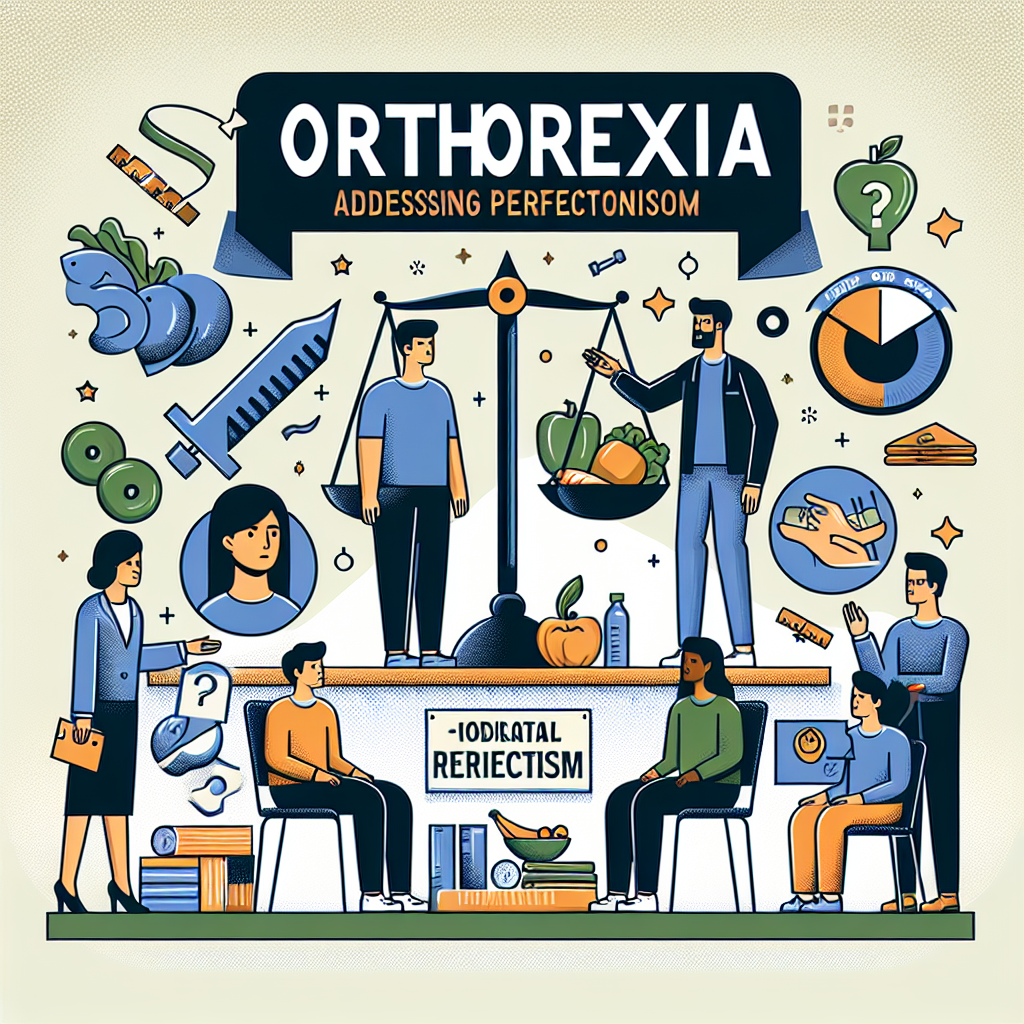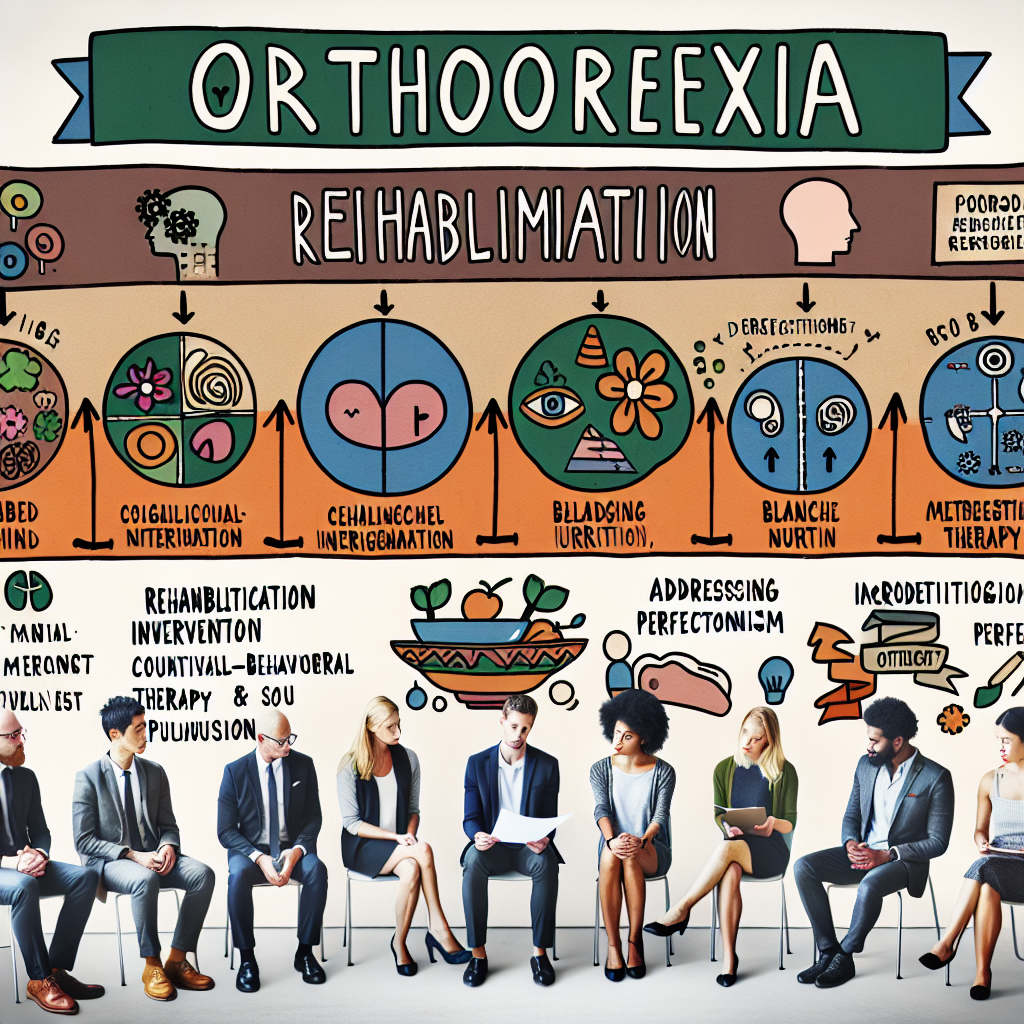-
Table of Contents

“Rehab for orthorexia: Transforming perfectionism into balanced wellness.”
Introduction
Rehabilitation for orthorexia, an eating disorder characterized by an obsession with healthy eating, often addresses underlying issues of perfectionism that contribute to the condition. Perfectionism in orthorexia manifests as an unrelenting pursuit of dietary purity and an extreme fear of consuming foods deemed unhealthy. Rehab programs typically incorporate cognitive-behavioral therapy (CBT) to help individuals recognize and challenge perfectionistic thoughts and behaviors. By fostering a more flexible and balanced approach to eating, these programs aim to reduce the rigid standards that drive orthorexic tendencies. Additionally, rehab may include mindfulness practices, stress management techniques, and support groups to build self-compassion and resilience, ultimately helping individuals to develop a healthier relationship with food and their bodies.
Understanding the Role of Perfectionism in Orthorexia Recovery
Orthorexia, an eating disorder characterized by an obsession with healthy eating, often intertwines with perfectionism, creating a complex web that can be challenging to untangle. Understanding the role of perfectionism in orthorexia recovery is crucial, as it provides insight into the underlying psychological factors that drive the disorder. Rehab for orthorexia addresses perfectionism by employing a multifaceted approach that targets both the behavioral and cognitive aspects of this condition, ultimately fostering a healthier relationship with food and self.
To begin with, perfectionism in orthorexia manifests as an unrelenting pursuit of dietary purity. Individuals with orthorexia often set rigid and unrealistic standards for their eating habits, believing that any deviation from their self-imposed rules equates to failure. This black-and-white thinking can lead to severe anxiety, guilt, and shame, further entrenching the disorder. In rehab, therapists work to dismantle these perfectionistic tendencies by encouraging patients to adopt a more flexible and compassionate mindset. Cognitive-behavioral therapy (CBT) is particularly effective in this regard, as it helps individuals identify and challenge their perfectionistic thoughts, replacing them with more balanced and realistic perspectives.
Moreover, rehab programs emphasize the importance of self-compassion in the recovery process. Perfectionism often stems from a deep-seated fear of inadequacy and a desire for control. By fostering self-compassion, therapists help individuals recognize their inherent worth, independent of their dietary choices. Mindfulness-based interventions, such as mindfulness-based stress reduction (MBSR) and mindfulness-based cognitive therapy (MBCT), are instrumental in cultivating self-compassion. These practices teach individuals to observe their thoughts and feelings without judgment, allowing them to develop a kinder and more accepting attitude towards themselves.
In addition to cognitive and emotional strategies, rehab for orthorexia incorporates practical skills to manage perfectionism. Nutritional counseling plays a pivotal role in this aspect, as it provides individuals with evidence-based information about balanced eating. Dietitians work collaboratively with patients to create personalized meal plans that accommodate their nutritional needs while challenging their rigid food rules. This process helps individuals gradually reintroduce feared foods into their diet, reducing anxiety and promoting a more varied and enjoyable eating experience.
Furthermore, group therapy offers a supportive environment where individuals can share their struggles and successes with others who understand their experiences. This sense of community is invaluable, as it helps individuals realize that they are not alone in their journey. Hearing others’ stories can inspire hope and motivate individuals to persevere in their recovery. Group therapy also provides opportunities for individuals to practice social skills and build connections, which can counteract the isolation often associated with orthorexia and perfectionism.
Lastly, rehab programs recognize the importance of addressing the broader context of an individual’s life. Perfectionism in orthorexia is often linked to other areas where individuals feel the need to excel, such as academics, career, or personal relationships. By exploring these connections, therapists can help individuals develop healthier coping mechanisms and set more realistic goals. This holistic approach ensures that recovery is not limited to eating behaviors but extends to overall well-being.
In conclusion, rehab for orthorexia addresses perfectionism through a comprehensive approach that combines cognitive-behavioral therapy, mindfulness practices, nutritional counseling, group therapy, and holistic life assessment. By targeting the root causes of perfectionism and promoting self-compassion, flexibility, and community support, rehab programs empower individuals to break free from the constraints of orthorexia and embrace a more balanced and fulfilling life.
Strategies Used in Rehab to Combat Perfectionism in Orthorexia Patients
Rehabilitation for orthorexia, an eating disorder characterized by an obsession with healthy eating, often involves addressing underlying issues of perfectionism. This perfectionism can manifest as an unyielding desire to adhere to strict dietary rules, leading to physical and emotional distress. To combat this, rehab programs employ a variety of strategies designed to help patients develop a healthier relationship with food and themselves.
One of the primary strategies used in rehab is cognitive-behavioral therapy (CBT). CBT helps patients identify and challenge the irrational beliefs that fuel their perfectionism. For instance, a patient might believe that eating anything deemed “unhealthy” will lead to immediate negative consequences. Through CBT, they learn to recognize these thoughts as distortions and replace them with more balanced perspectives. This shift in thinking is crucial for reducing the anxiety and guilt associated with eating, thereby loosening the grip of perfectionism.
In addition to CBT, mindfulness practices are often incorporated into rehab programs. Mindfulness encourages patients to stay present and observe their thoughts and feelings without judgment. This practice can be particularly effective for those with orthorexia, as it helps them become aware of their perfectionistic tendencies without being consumed by them. By fostering a non-judgmental awareness, patients can begin to accept imperfections in their eating habits and overall lifestyle, which is a significant step toward recovery.
Another important aspect of rehab is nutritional counseling. Dietitians work closely with patients to develop a balanced and flexible approach to eating. This process involves educating patients about the nutritional needs of the body and debunking myths about “good” and “bad” foods. By providing factual information and practical guidance, nutritional counseling helps patients build confidence in their ability to make healthy choices without resorting to extreme measures. This newfound confidence can diminish the need for perfectionism in their dietary habits.
Group therapy also plays a vital role in addressing perfectionism in orthorexia patients. Sharing experiences with others who face similar challenges can be incredibly validating and empowering. In a group setting, patients can see that they are not alone in their struggles and can learn from the coping strategies of their peers. This sense of community and support can alleviate the isolation often felt by those with orthorexia, making it easier to let go of perfectionistic standards.
Furthermore, rehab programs often include activities that promote self-compassion and self-care. These activities might involve creative expression, physical exercise, or relaxation techniques. The goal is to help patients develop a kinder, more forgiving relationship with themselves. By engaging in activities that bring joy and relaxation, patients can begin to see that their worth is not tied to their dietary choices. This realization is crucial for breaking the cycle of perfectionism.
Lastly, ongoing support and aftercare are essential components of rehab for orthorexia. Recovery is a continuous journey, and having access to resources and support can make a significant difference. Follow-up sessions with therapists, support groups, and continued nutritional counseling can help patients maintain the progress they have made and prevent relapse. This sustained support reinforces the idea that perfection is not the goal; rather, progress and self-acceptance are the true markers of recovery.
In conclusion, rehab for orthorexia addresses perfectionism through a multifaceted approach that includes cognitive-behavioral therapy, mindfulness practices, nutritional counseling, group therapy, self-compassion activities, and ongoing support. By tackling the root causes of perfectionism and providing patients with the tools and support they need, rehab programs empower individuals to develop a healthier, more balanced relationship with food and themselves. This holistic approach not only aids in recovery but also inspires patients to embrace their imperfections and live more fulfilling lives.
Q&A
1. **Question:** How does cognitive-behavioral therapy (CBT) in orthorexia rehab address perfectionism?
**Answer:** CBT in orthorexia rehab addresses perfectionism by helping individuals identify and challenge their perfectionistic thoughts and behaviors, and by teaching them healthier, more flexible ways of thinking about food and health.
2. **Question:** What role does mindfulness play in addressing perfectionism in orthorexia rehab?
**Answer:** Mindfulness in orthorexia rehab helps individuals become more aware of their perfectionistic tendencies and learn to accept imperfections without judgment, thereby reducing the compulsive need for dietary perfection.
Conclusion
Rehab for orthorexia addresses perfectionism by implementing therapeutic interventions that focus on cognitive-behavioral techniques to challenge and reframe perfectionistic thoughts, promoting self-compassion and realistic goal-setting. It also includes nutritional counseling to develop a balanced approach to eating, and mindfulness practices to reduce anxiety and obsessive behaviors. Group therapy and support networks provide a sense of community and shared experiences, helping individuals to understand that perfection is unattainable and encouraging acceptance of imperfection as a natural part of life.



